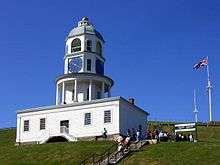Cornwallis Street Baptist Church

Cornwallis Street Baptist Church (formerly known as the African Chapel and the African Baptist Church) is a baptist church in Halifax, Nova Scotia that was established by Black Refugees in 1832. When the chapel was completed, black citizens of Halifax were reported to be proud of this accomplishment because it was evidence that former slaves could establish their own institutions in Nova Scotia.[1] Under the direction of Richard Preston, the church laid the foundation for social action to address the plight of Black Nova Scotians.[2] [3]
History
19th Century

Preston and others went on to establish a network of socially active Black baptist churches throughout Nova Scotia, with the Halifax church being referred to as the "Mother Church."[4] Five of these churches were established in Halifax: Preston (1842), Beechville (1844), Hammonds Plains (1845), and another in Africville (1849) and Dartmouth.[5] From meetings held at the church, they also established the African Friendly Society, the African Abolition Society, and the African United Baptist Association. In the fight to end slavery in America, Preston stated:
- The time will come when slavery will be just one of our many travails. Our children and their children’s children will mature to become indifferent toward climate and indifferent toward race. Then we will desire . . . Nay!, we will demand and we will be able to obtain our fair share of wealth, status and prestige, including political power. Our time will have come, and we will be ready . . . we must be.[6]
The church was eventually renamed the Cornwallis Street Baptist Church (1892).
20th Century

The Church survived the Halifax Explosion of 1917 and served as a temporary shelter for survivors for the rest of the winter. Soon after the explosion, Rev. William A. White worked at the church for 17 years until he died in 1936. In 1937, William Pearly Oliver became the minister and by 1945 he and the church developed the Nova Scotia Association for the Advancement of Colored People. The Church was instrumental in supporting the case of Viola Desmond through the courts in the first year Oliver was the minister. Oliver worked at the church for twenty-five years, until 1962.
Legacy
Cornwallis Street has continued its history of social action through the years. The church has been led by visionary pastors committed to community uplift. For over 30 years the church ran a Hot Lunch Program to feed local school children. The children dubbed the church "The Dinner Church".
In 2005 the church was the subject of a three episode television documentary. The design project renovated the church's lower hall as a dedicated space for Sunday School.
In 2007, Cornwallis Street called its first female pastor in the person of Rev. Rhonda Y. Britton, an American who was serving another AUBA church in New Glasgow, NS. Rev. Britton completed her Doctor of Ministry degree from Acadia University in 2012 and continues to serve Cornwallis Street. Under Dr. Britton's leadership Cornwallis Street began a Rites of Passage Program for youth 8-18 in an effort to address the growing violence plaguing the black community.
In 2009 Rev. Richard Preston was designated a person of national significance by Parks Canada. The commemorative plaque is mounted outside the church.[7]
Notable members
- Richard Preston
- William A. White
- James Robinson Johnston
- Portia White
- Viola Desmond
- John Burton (minister)
- William Pearly Oliver
- Robert Downey (boxer)[8]
See also
References
Links
- African Baptist Association of Nova Scotia - History
- Video: Dave Downey - inducted into the Nova Scotia Sport Hall of Fame
